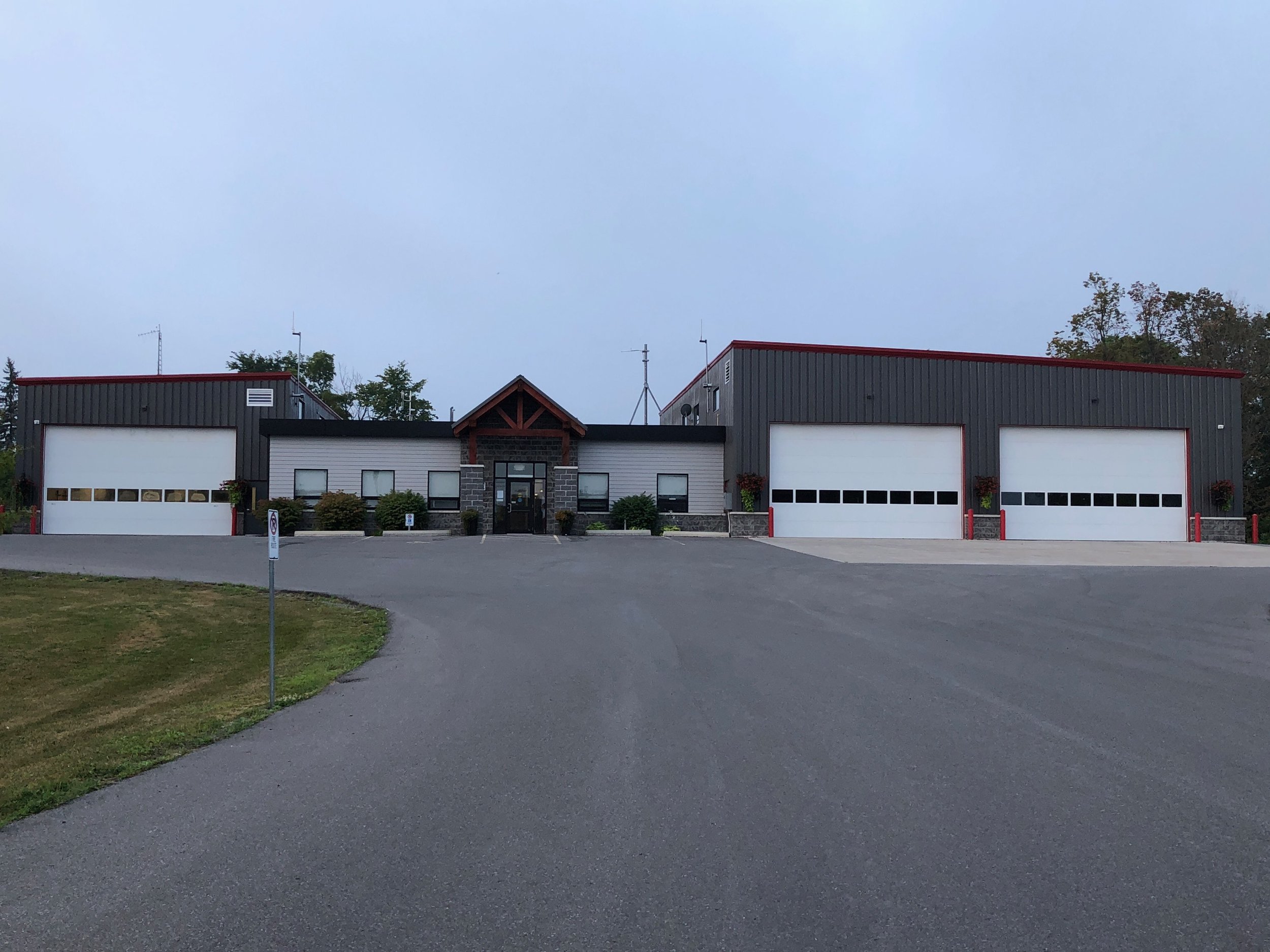Fire/Bylaw Department
Home / Township Government / Fire/Bylaw Department
Emergency Services
In an emergency, please call 911.
The Township of Alnwick/Haldimand helps keep our community safe through emergency services, planning and preparedness. The Fire Department and Ontario Provincial Police provide our community with emergency response services.
Fire Department
The Township of Alnwick/Haldimand has three (3) district area Volunteer Fire Stations. These Stations provide fire protection services to the residents and visitors of the Municipality. The Stations are located in Grafton, Centreton and Roseneath.
The Alnwick/Haldimand Fire Rescue also provide Fire Protection Services to Alderville First Nation under the provisions of the mutually signed Agreement between the Band Council of Alderville First Nation and the Council of the Township of Alnwick/Haldimand.
Mutual Aid Services are provided by the part-time, on-call Fire Departments when needed. Mutual Aid Services allows Alnwick/Haldimand Fire Rescue to provide help to or get help from another participating municipality.
Within our Township, volunteer firefighters use their own vehicles to travel to our halls when responding to emergency calls. These vehicles are sometimes equipped with flashing green lights that our volunteers will use to notify other drivers on the road that they are on route to an emergency.
Volunteers often respond to calls that require a fair distance of travel, in an emergency, sometimes it can be mere seconds that makes a difference in the outcome. The green light system is a proactive measure to help notify residents that the vehicle is responding to a call and if possible, allow them to pass and helping contribute to a quicker response time to the scene.
Volunteer firefighters traveling to an emergency have to abide by the Highway Traffic Act, meaning that they can not speed or drive through red lights. This tool is something that is used by volunteers across Ontario to help encourage drivers to be courteous and yield the right-of-way, allowing the vehicle to pass where and when it safe to do so.
“Flashing Green Light” signage is installed in our community to help spread awareness and clarity on the meaning behind the lights. The Township of Alnwick/Haldimand Fire Department encourages all residents to help spread the word to those who are unaware or who have never seen the lights before.
Burn Permits and Fireworks Permits
You can apply online for a burn/fireworks permit, or visit the Fire Administration Office located at 9160 County Road 45, Roseneath. Tenants must contact the property owner for permission to apply for a burn/fireworks permit.
If you would like to have a controlled fire on your property, you need to apply for a burn permit.
Any person setting an open-air fire in the Township of Alnwick/Haldimand is responsible for any damage to property or injury to persons caused by said fire. They are also liable for all costs incurred by the Fire Department of the Township of Alnwick/Haldimand. Costs include equipment, all personnel, and apparatus responding to extinguish the open-air fire.
The complete rules of the burn permit are in the Open-Air Burn By-law.
A burn permit is valid until December 31st of the year of issue. Each time you have a controlled fire, you must contact 289-677-1714 to activate your permit. This is an automated system and you are required to enter your 10 digit telephone number using your telephone key pad. Each activation will last 24 hours. If you wish to burn again after the 24 hour limit, please call back to re-activate.
Burn/Fireworks Permit Fees
-
Does not permit more than 1 metre x 1 metre x 1 metre (3' x 3' x 3') of material to be burned at any one time for a property that meets the required setback.
Must be a minimum of 15 metres (50') from any structure. Rural residents must be 100 metres (330') from any structure to burn brush piles.
The burning material must be limited to wood or by-products of wood.
Please see the Open-Air Burn By-law for all terms and conditions.
-
Only one permit is required for a Municipally Licensed Campground establishment.
Fires must be in an Approved Device, be contained to prevent the spreading of fire.
The burning material must be limited to wood or by-products of wood.
Please see the Open-Air Burn By-law for all terms and conditions.
-
The Fire Chief may issue special permits for larger fires based on an approved plan.
Please see the Open-Air Burn By-law for all terms and conditions.
-
"Family Fireworks" means an outdoor, low hazard, firework, that is designed for recreational personal use.
Pursuant to Section 4.1 of By-Law No. 60-2022, a permit application shall be completed for the discharging of family fireworks.
Please see By-Law No. 60-2022 for all terms and conditions
-
Display Fireworks means an outdoor, high-hazard, firework that is designed for professional, licenced use only.
Theatrical Fireworks means an authorized explosive of a classset out in section 6 of the in Section 6 of the Explosives Act, that is mademanufactured, or used toproduce a pyrotechnic theatrical effect in conection with a motion picture, theatre or televisionproduction, or as a performance, before a live audience.
Fireworks By-Law Complaint: In the case of an emergency, you should call 911, if the matter is not an emergency, but requires immediate attention, please call 1-855-574-5265.
Carbon Monoxide Detectors
What is Carbon Monoxide (CO)?
CO is an invisible, tasteless and odourless gas that can be deadly.
CO production happens when fuels do not burn completely in fuel-burning appliances and devices.
Prevent CO in your home:
Ensure yearly cleaning and inspection of fuel-burning appliances, chimneys and vents. Visit COSafety.ca to find a registered contractor near you.
Check that all outside appliance vents are not blocked.
Gas and charcoal barbecues should only be used outside, away from all building openings. Never use barbecues inside garages, even if the garage doors are open.
Portable fuel-burning generators should only be used outdoors in well-ventilated areas away from building openings.
Ensure all portable fuel-burning heaters are vented properly, according to maker's instructions.
Never use the stove or oven to heat your home.
Open the flue before using a fireplace for ventilation.
Never run a vehicle or other fueled engine or motor inside a garage, even if the garage doors are open. Always remove a vehicle from the garage immediately after starting it.
Symptoms of CO poisoning
-
Tiredness
Headaches
Shortness of breath
Impaired motor functions, such as:
Muscle weakness
Partial or total loss of function of a body part (limb or limbs)
-
Dizziness
Chest pain
Poor vision
Difficulty thinking
-
Convulsions
Coma
Death
Awareness Week
Ontario's CO Awareness Week runs from November 1-7. The Alnwick/Haldimand Fire department reminds you to prevent CO in your home by getting all fuel-burning appliances inspected yearly. Visit COSafety.ca to find a registered contractor near you.
Carbon Monoxide Alarms
The Hawkins Gignac Act is in place for CO safety. The Government of Ontario provides helpful CO resources listed below:
Carbon monoxide in condo/apartment units
Carbon monoxide in houses
Carbon monoxide: Beat the Silent Killer
Carbon monoxide infographic
Door Hanger
Information Sheet
Print public service announcement
RVs, Trailers and Campers – Carbon Monoxide Alarms
Smoke Alarms
Frequently Asked Questions
-
Ontario law requires that working smoke alarms are installed:
On every story of the home
Outside all sleeping areas
-
If your smoke alarm goes off ensure you alert your family members and start your home fire escape plan. Every second counts so get outside and stay outside!
-
Test smoke alarms monthly. Press the test button to be sure the alarm is working.
Test the smoke alarm after installing a new battery
Test smoke alarms upon returning home after an absence of more than a few days
Replace smoke alarms every 10 years
Follow manufacturer's cleaning instructions to keep smoke alarms working well. The instructions can be found in the package or on the internet
Follow manufacturer's list of batteries on the back of the alarm or in the instructions when they are in need of replacement. Instructions are specific to the batteries that must be used
-
Install a new battery once a year or whenever the low battery warning sounds
If alarm fails to sound when the test button is pressed, install a new battery
If alarm fails after installing a new battery you will need to purchase a new alarm
Follow manufacturer's list of batteries on the back of the alarm or in the instructions when they are in need of replacement. Instructions are specific to the batteries that must be used
-
Do not remove the battery!
Try moving the smoke alarm or purchase a smoke alarm with a hush feature
Replace alarms near the kitchen or shower with a photoelectric alarm
If you hear chirping or beeping your alarm may have reached its end of life
Develop a Home Escape Plan
Make sure everyone knows what to do if the smoke alarm sounds. Select a safe “meeting place” outside. Always have two (2) means of escape. Keep elderly/infirm family members in mind. Practice your escape at least twice a year to allow for seasonal issues that may arise.
This document can help you plan your escape.
Contact Us
Dianne Nicholls, Alt. CEMC
Fire Administrative Assistant
Alnwick/Haldimand Fire Rescue
9160 County Road 45
Roseneath ON, K0K 2X0
T. 905-352-1142
Dave Dawson
CAO/Fire Chief/CEMC
Alnwick/Haldimand Fire Rescue
9160 County Road 45
Roseneath ON, K0K 2X0
T. 905-352-1142



